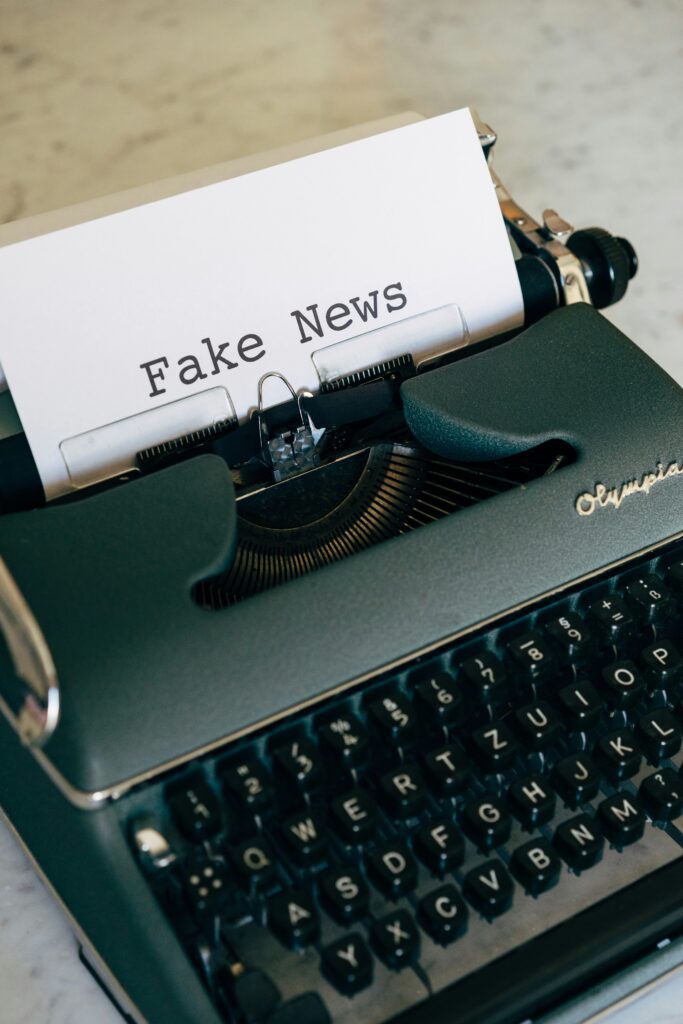Navigating Truth in the Digital Age: Ethical PR Practices Amidst Misinformation, AI, and the Rise of Spin

In a world surrounded by claims of fake news and manipulated narratives, it’s crucial that future PR professionals learn to make ethical choices in their careers. With technology distributing information faster than ever and AI use on the rise, it’s easy for PR professionals to get caught up in the “spin doctor” mentality, where information is blurred.
Image- Unsplash: Black and white typewriter on white table photo – Free Keyboard Image on Unsplash
In Drilled Season 3, The Mad Men of Climate Denial, the podcast covers various issues of early PR practices and the people behind them, directly correlating to the oil and fossil energy industry. The beginnings of public relations involved various ethical and legal issues, one being the deliberate creation and release of misleading information (Hostinger, 2020). Releasing misinformation may start as an ethical issue but can soon turn into a legal issue when it crosses into fraud, deceptive practices, and false advertising.
The Price of Deception: How Ethical PR and Transparency Combat Greenwashing and Misinformation
Today, we still face ethical and legal challenges in the world of PR. The ethical issue of releasing misinformation is countered by the “Free Flow of Information” provision in the PRSA Code of Ethics,, which holds PR professionals to a high standard of honesty, stating they should “Be honest and accurate in all communications” (Public Relations Society of America [PRSA], n.d.). The ethical values of honesty and transparency in public relations help ensure public trust is maintained and prevent legal issues and damage to a brand’s image.
One example seen in today’s PR is work revolving around greenwashing. Greenwashing is defined as “the practice of misleadingly presenting a company, product, or initiative as environmentally friendly or sustainable” and can lead to companies being called out in the media for this unethical practice (Hasherj, n.d., p. 3).
“If they’re being fed a lot of false or misleading statements, then they really can’t make an informed decision about where to spend their money”
Carrie Apfel, attorney for Earthjustice, an environmental law firm (Brown, 2024)
In a recent example, in September 2024, Tyson Foods was sued for greenwashing. Claiming that their products would soon reflect “climate-smart” beef, a lawsuit revealed that these misleading statements showed no intention of achieving sustainable or environmentally friendly practices. With 20% of meat sold by Tyson in the U.S., misleading claims like this harm consumers’ purchasing choices and damage the brand (Brown, 2024).
Tyson’s false claim was a poor choice by the PR team, as the greenwashing lawsuit damages its brand reputation and undermines consumer trust. Misleading environmental claims misinform buyers about the sustainability of its products, which could result in decreased consumer loyalty and potentially lower sales. The legal consequences of the case may also force Tyson to reassess its sustainability practices and communication strategies to rebuild its credibility.
Image- Unsplash: Person holding orange and white plastic pack photo – Free Sesame Image on Unsplash

Beyond the Spin: Why Ethics Are the Backbone of Public Relations
When PR campaigns stray into manipulation or deceit, whether through greenwashing or false claims, the loss can be catastrophic. Not only can these tactics ruin a brand’s image, but they can also lead to legal consequences and a breakdown of consumer trust. In a time when the public is more affected by misinformation than ever, ethical PR ensures that a brand’s message works with authenticity and builds relationships based on honesty.
In the ever-evolving field of communication, staying true to ethical practices is the best way to stand out—because beyond the spin, the truth will always come out.
References:
Brown, C. H. (2024, September 18). Tyson Foods sued for greenwashing. The Wall Street Journal. Retrieved from https://www.wsj.com/articles/tyson-foods-sued-for-greenwashing-f7290058
Hostinger, A. (Host). (2020, January 21). Drilled (Season 3, Episode 1). Drilled Media. https://drilled.media/podcasts/drilled/3/drilleds03-e01
Hasherj, D. (n.d.). Public relations, principles, origins, and practices (VBID: 844161A). Cognella Custom TB. Retrieved from https://macmillan.vitalsource.com/reader/books/844161A
PRSA Code of Ethics. (n.d.). Retrieved February 10, 2025, from https://www.prsa.org/about/prsa-code-of-ethics
Unsplash. (n.d.). Photo by Markus Winkler on Unsplash. Retrieved February 13, 2025, from Unsplash.com website: https://unsplash.com/photos/black-and-white-typewriter-on-white-table-BCvjjPU5RG4
Unsplash. (n.d.). Photo by Tyson on Unsplash. Retrieved February 13, 2025, from Unsplash.com website: https://unsplash.com/photos/person-holding-orange-and-white-plastic-pack-BDTInKXIflU
